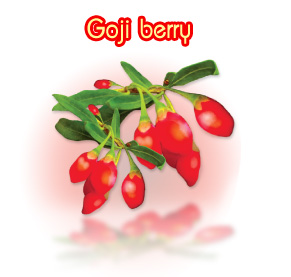
 |
Goji berry Goji berry (wolfberry or guoqi) has beta-carotene more than carrot and has more vitamin C than orange. Benefits 1. helps nourishing blood, blood pressure, red blood cell and lower cholesterol. Also stimulate blood cycle rate and help blood tube to be more flexible 2. stops white blood cell initiate for cancer treatment patient 3. helps nourishing sight problem 4. nourishing Liver,Kidney and Cardiac 5. Anti-aging 6. Helps a better sleep 7. Enhancing a sex activities capability Micronutrients and Ingredients Goji berrycontain many nutrients and phytochemicals including ● 11 essentials and 22 trace dietaryminerals ● 18 aminoacids ● 6 essential vitamins ● 8 polysaccharidesand 6 monosaccharides ● 5 unsaturated fattyacids, including the essential fatty acids, linoleicacidandalpha-linolenicacid ● beta-sitosteroland other phytosterols ● 5 carotenoids, including beta-caroteneand zeaxanthin(below), lutein, lycopeneandcryptoxanthin, a xanthophyll ● numerous phenolic pigments(phenols) associated with antioxidantproperties Select examples given below are for 100 grams of dried berries. ● Calcium. Wolfberries contain 112 mg per 100 gram serving, providing about 8-10% of the DietaryReferenceIntake(DRI). ● Potassium. Wolfberries contain 1,132 mg per 100 grams dried fruit, giving about 24% of the DRI. ● Iron. Wolfberries have 9 mg iron per 100 grams (100% DRI). ● Zinc. 2 mg per 100 grams dried fruit (18% DRI). ● Selenium. 100 grams of dried wolfberries contain 50 micrograms (91% DRI) ● Riboflavin(vitaminB2).At 1.3 mg, 100 grams of dried wolfberries provide 100% of DRI. ● VitaminC. Vitamin C content in dried wolfberries has a wide range (from different sources[citationneeded]) from 29 mg per 100 grams to as high as 148 mg per 100 grams (respectively, 32% and 163% DRI). Goji berryalso contains numerous phytochemicals which there are no established DRI values. Examples: ● Beta-carotene: 7 mg per 100 grams dried fruit. ● Zeaxanthin. Reported values for zeaxanthin content in dried wolfberries vary considerably, from 2.4 mg per 100 grams[39]to 82.4 mg per 100 grams[40]to 200 mg per 100 grams.[41]The higher values would make wolfberry one of the richest edible plant sources known for zeaxanthin content.[42]Up to 77% of total carotenoids present in wolfberry exist as zeaxanthin.[43] ● Polysaccharides. Polysaccharides are a major constituent of wolfberries, representing up to 31% of pulp weight. |









